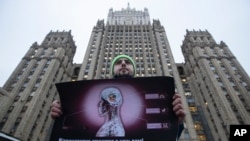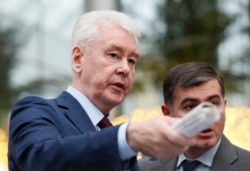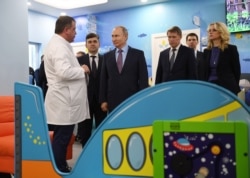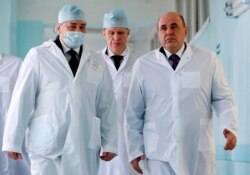Russia has ramped up efforts to battle the spread of the coronavirus, imposing a “high-alert regime” in the capital and canceling a flagship international economic forum in St. Petersburg as precautionary measures.
Russia acted as six new cases of infection were reported — five in Moscow, and one in Nizhny Novgorod — bringing the national total to 10.
Authorities said the new cases involved Russians who had recently returned from Italy, which has seen a recent spike in infections. A later statement from city health officials said Russia’s first coronavirus-infected patient had fully recovered.
Regardless, the wider Russian response came as the number of those infected by the virus closed in on 100,000 worldwide, with the World Health Organization pleading with governments to increase efforts to combat the contagion.
Home sweet home
Under new rules posted to the Moscow city government website Thursday night, Russians returning from China, South Korea, Iran, France, Germany, Italy, Spain and other nations facing “unfavorable” battles with the coronavirus will be required to “self-isolate” in a home quarantine for 14 days.
An updated list Friday briefly included travelers from the United States, Britain, Norway and Switzerland to the quarantine list -- restrictions that Moscow City Government removed by the following day..
“It’s obvious that closing the border completely is impossible. Each day thousands of people fly to Moscow from all over the world,” wrote Moscow Mayor Sergey Sobyanin in a blog post that warned additional cases were all but inevitable.
“Therefore it’s doubtful Moscow can avoid new illnesses,” added Sobyanin.
Yet there was more immediate confusion over how Sobyanin’s home quarantine plan should be implemented or enforced.
Mediazona, an independent website that often reports on the security services, reported that police were using cameras around the city to track quarantined patients' movements.
Russia’s independent Novaya Gazeta, for example, reported cases in which two Muscovites, under quarantine following a trip to Italy, were visited by police after taking out the trash and warned of possible fines.
Meanwhile, there were simpler questions, such as how the measure would apply to tourists, family members and pets.
The head of Moscow’s health department, Alexey Khripun, suggested the simplest solution was for Russians and others to simply stay put.
“The world, and Muscovites with it, are coming to understand more and more that right now is not the time to go abroad,” Khripun said in an interview with Russian media.
White nights can wait
Russia canceled its annual St. Petersburg Economic Forum as a precautionary measure against the spread of infection. The forum is a high-profile event, hosted by President Vladimir Putin, that brings together leading figures from the world of politics and business each June.
In a separate move, students at a university dormitory in St. Petersburg were placed under quarantine after an Italian exchange student who had been living there was reported with some coronavirus-like symptoms.
Back in Moscow, precautions also extended to Russia’s Foreign Ministry, which encouraged journalists displaying signs of any illness not to attend a weekly press briefing. Those who did choose to attend had their temperatures taken upon entering the building.
Meanwhile, Russia’s national air carrier announced it would suspend flights to Hong Kong, adding to the suspension of flights to mainland China last month.
Smaller Russian carriers S7 and Pobeda, faced with growing passenger anger, introduced new plans to refund money to customers who were forced to cancel travel plans because of the spread of the virus.
Mishustin’s moment
Russia’s government has sought to project an air of competence surrounding its response to the virus, which is the first serious test of new Prime Minister Mikhail Mishustin’s government since he was appointed by Putin in a surprise Kremlin shakeup last January.
Among measures taken so far: Mishustin ordered most entry points along Russia’s 4,200-kilometer border with China closed and temporarily banned issuing visas to Chinese nationals.
The government also ordered the evacuation of Russian nationals from Wuhan, China, the epicenter of the global outbreak, by military escort. Evacuees were subsequently placed in a government quarantine center in Siberia.
While government health officials say those efforts have successfully prevented a wider outbreak of coronavirus thus far, they have not quelled suspicion of under-reporting.
“There are whole regions where there are more Chinese than Russians. And yet there are no sick. No one infected. Either the Chinese virus doesn’t work on us, or Chinese nationals, upon entering Russia, are suddenly cured,” wrote Anton Orekh, an ombudsman with the Echo of Moscow radio, in a commentary that suggested Russian officials were downplaying the official number of coronavirus cases since the outbreak.
True or not, it was a view seemingly shared by older Russians who long ago grew skeptical of government spin during health and environmental crises from Russia’s Soviet past.
“Of course there are more cases,” said Tatiana, 61, a shop clerk in central Moscow, in an interview with VOA.
“They’re just hiding them from us.”








